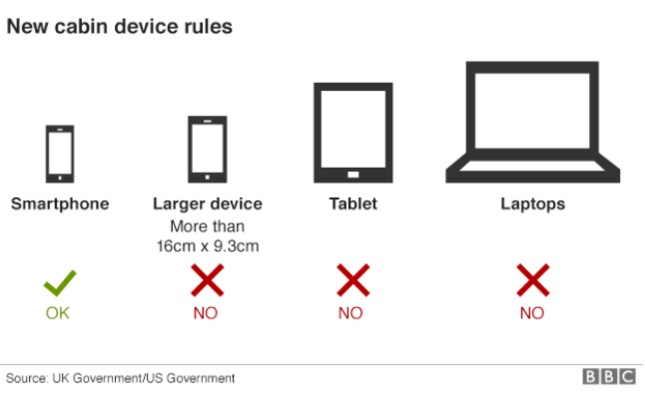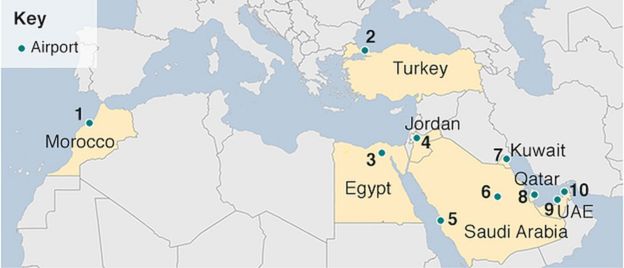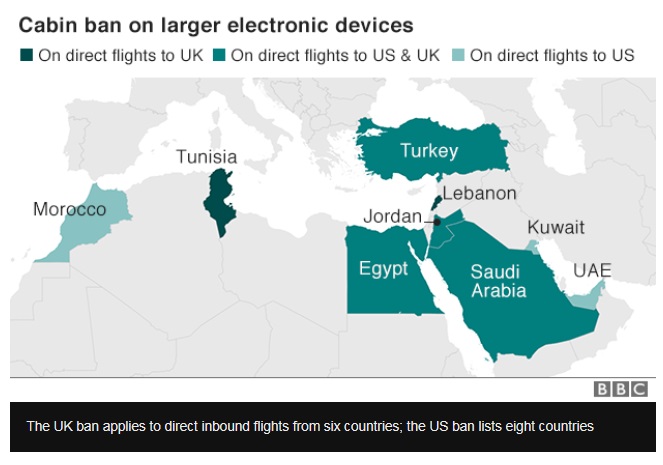
The US and UK are banning laptops from cabin baggage on flights from certain countries in the Middle East and North Africa, as well as Turkey.
The US ban on electronic devices larger than a smartphone is being imposed as an anti-terrorist precaution.
It covers inbound flights on nine airlines operating out of 10 airports. Phones are not affected.
The British ban, announced hours after the American measure, is similar but applies to different airlines.
Downing Street said airline passengers on 14 carriers would not be able to carry laptops in cabin luggage on inbound direct flights from Turkey, Lebanon, Jordan, Egypt, Tunisia and Saudi Arabia.
The Turkish government said the US ban was wrong and should be reversed.
Large electronic devices will still be allowed on board in checked baggage.
Canadian Transport Minister Marc Garneau said his country was also considering restrictions on electronics in the cabins of planes.
Which flights are affected?
British Airways and EasyJet are among the airlines affected by the UK ban.
The nine airlines affected by the US ban are Royal Jordanian, EgyptAir, Turkish Airlines, Saudi Arabian Airlines, Kuwait Airways, Royal Air Maroc, Qatar Airways, Emirates and Etihad Airways.
The 10 airports affected are:

- Mohammed V International, Casablanca, Morocco
- Ataturk Airport, Istanbul, Turkey
- Cairo International Airport, Egypt
- Queen Alia International, Amman, Jordan
- King Abdulaziz International, Jeddah, Saudi Arabia
- King Khalid International, Riyadh, Saudi Arabia
- Kuwait International Airport
- Hamad International, Doha, Qatar
- Abu Dhabi International, United Arab Emirates
- Dubai International, United Arab Emirates
- The airlines included in the US decision have been given a deadline of 07:00 GMT on Saturday to impose the ban, officials said, adding that the restriction had no end date.
However, an Emirates spokeswoman told Reuters news agency the airline understood that the US directive would come into effect on 25 March and remain valid until 14 October 2017.

Why now?
The restriction is based, we are told, on "evaluated intelligence", BBC security correspondent Frank Gardner writes.
That means that US intelligence has either intercepted discussion of a possible extremist plot or has been passed word of one by a human informant.
The Middle Eastern and North African airports affected are nearly all ones with close, friendly relations with Washington, so this will be seen by some as a drastic and unpopular measure. Wealthy Gulf Arab business leaders flying to the US, for example, will no longer be able to work on their laptops mid-flight.
But aviation security experts were alarmed by an incident in Somalia last year when the insurgent group al-Shabaab smuggled an explosive-filled laptop on a flight out of Mogadishu, blowing a hole in the side of the plane. The aircraft was still low enough that the pilot was able to land the plane safely.

